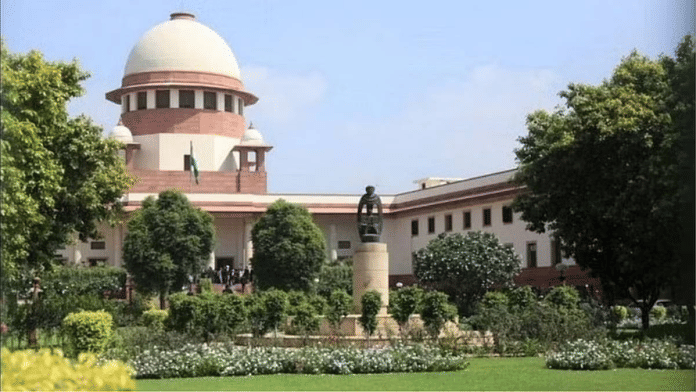New Delhi: The Supreme Court Friday upheld the resolution plan of JSW Steel Limited to acquire Bhushan Power and Steel Limited (BPSL), as it allowed a batch of review petitions that had questioned its earlier order to liquidate the company. A bench of Chief Justice of India B.R. Gavai and Justices S.C. Sharma and K. Vinod Chandran upheld the 17 February 2020 order of the National Company Law Appellate Tribunal (NCLAT) order, which approved JSW’s resolution plan through the Corporate Insolvency Resolution Process (CIRP) route.
JSW’s Rs 19,000 crore bid to take over BSPL was made under the Insolvency and Bankruptcy Code (IBC).
Friday’s judgment re-examined all the contentions that were dealt in the earlier judgment, but differed in its conclusion. It said that IBC’s dominant purpose is to revive the company and liquidation proceedings are the final option in the insolvency framework.
The judgment evaluated the role of the Committee of Creditors (CoC) in the scheme to revive the company and held that it has a vital interest in the resolution plan, adding that such an interest would continue till the resolution plan is actually implemented.
With this finding, the bench dismissed the opposition raised by BSPL’s erstwhile management that the CoC, in the given case, continued to function even after the resolution plan was approved. This, according to it, invalidated the insolvency process.
The bench also dismissed the assertion that JSW delayed implementing the resolution plan. It was the Enforcement Directorate’s (ED) proceedings against the corporate debtor—BSPL’s erstwhile management—which hindered the steel company’s revival plan, it said.
Friday’s judgment came on an appeal filed by BSPL which had challenged NCLAT’s 2020 verdict that upheld National Company Law Tribunal’s (NCLT) move to approve CoC’s resolution plan to restructure BSPL. It may be recalled that in May 2025, an SC bench of Justices Bela Trivedi and S.C. Sharma had quashed the NCLAT order, saying the resolution plan approved by the CoC was “not in conformity with the provisions… of the IBC”.
Pointing to the procedural infirmities, the bench exercised its suo motu powers under Article 142 and directed NCLT to initiate liquidation proceedings against BPSL.
Subsequently, review petitions were filed in the Supreme Court, with both CoC and JSW asserting BSPL was a profit-making company. “The corporate debtor (Bhushan Steel) in the present case was running into substantial losses which has now become a profit–making entity earning substantial profits,” the bench held in its judgement.
“The Successful Resolution Applicant (SRA) JSW invested huge amounts in modernisation and expansion of the entity (corporate debtor). Not only that, but thousands of employees have been earning their livelihood on account of the corporate debtor running as an ongoing concern due to the resolution plan being implemented by the SRA-JSW,” it added.
“As such, the very purpose for which the IBC was enacted—namely, to ensure that the corporate debtor continues as a going concern—has not only been achieved, but the corporate debtor has been transformed from a loss-making to a profit-making entity. If, after the implementation of the Resolution Plan, the SRA–JSW has converted a loss-making entity into one making profits, can it be penalised for that?” asked the court.
The court did not go into the legal question of whether the erstwhile management of BSPL could have questioned the insolvency plan. But it made some critical remarks over its conduct.
It observed that attempts were made to thwart the CIRP and to not permit the same to be taken to a logical end.
The court delved in great detail on the objective behind IBC, which, it said, is to set into motion and conclude the insolvency process in a time–bound manner that would “result in the promotion of entrepreneurship and the balancing of the interests of all shareholders”.
However, the conduct of BSPL’s erstwhile promoters was contrary to the purpose of IBC. On an analysis, the bench concluded that the “conduct of the erstwhile promoters in the CoC meetings, before the NCLT, NCLAT and this Court would reveal that these appeals are an attempt to interfere with the task of reviving the Corporate Debtor undertaken by the SRA–JSW.”
Filing of various applications by the erstwhile management before various forums led to a delay in the pronouncement of the approval order by the NCLT.
This was noted by the NCLT as well, the court observed, adding the tribunal had imposed a cost of Rs 1 lakh on them for filing frivolous applications.
On the existence of CoC, after approval of the resolution plan, the bench said, non-functioning of this committee would leave creditors high and dry.
After studying the legislative intent, the bench said the new regulations of the IBC clearly mandate for the CoC to consider setting up the monitoring committee for monitoring and supervising the implementation of the Resolution Plan. “It can thus be seen that the legislative intent is to empower the CoC to monitor and supervise the implementation of the resolution plan through the monitoring committee,” the bench said.
It also took a view that concurrent view taken by the NCLT and NCLAT cannot be set aside unless it is found that it was in ignorance of the mandatory statutory provisions or was based on extraneous consideration or was ex-facie arbitrary or illegal.
In the present case, the court held, BSPL’s erstwhile promoter’s appeal does not fit in any of the aforesaid criteria.
It did not find fault with the CoC’s decision to extend the period for implementation of the resolution plan. This was done with the concurrence of 66 percent of the majority of the lenders forming part of the CoC. The extension of the time period was done to enable JSW to implement its proposal that got delayed on account of the pendency of ED proceedings.
The CoC, the court said, was not in a position to hand over the unencumbered assets as required under the resolution plan.
(Edited by Viny Mishra)
Also read: Bhushan Steel-JSW saga exposes cracks in insolvency code. Where’s the finality?






